Welcome to the Geek Vibes Nation Book Round-Up for July 2025! This month sees a thrilling new release from Daniel Kraus exploring the relentless horrors of war, a new Murderbot novelette from Martha Wells diving into the complexities of artificial intelligences grappling with human emotions, and a tetralogy of Doctor Who novelizations for Whovians to sink their teeth into. So, without further ado, let’s jump into some books!
 Angel Down by Daniel Kraus
Angel Down by Daniel Kraus
Daniel Kraus dives deep into the horrors of war through a single, run-on sentence in this harrowing tale of a group of soldiers who find a fallen angel in the middle of No Man’s Land during World War I. When an otherworldly shriek rings out across the battlefield, gravedigger Cyril Bagger and a group of the army’s lowliest soldiers must extinguish the shriek at all costs. But what the group finds may just change the course of the entire war—and humanity itself. In Angel Down, Kraus details a descent into madness through a single, unending sentence, highlighting the cyclical, unyielding march of war. It’s an often slow-paced, relentless, and immensely tense read that takes a little bit to hook you, but once it does, Angel Down grips you by the collar and never lets go.
While you might think the notion of a novel told in a single run-on sentence might be daunting, rest assured that it’s easy to fall into the rhythm of Kraus’s writing. The very structure of Angel Down only goes to further Kraus’ point about the relentlessness of war, the constant agony, the total hopelessness, and the notion that things just keep happening and keep happening and they never, ever, ever stop. Angel Down offers a horrific mirror of humanity at its worst—the pain we inflict on ourselves and each other, the horror of living in utterly hopeless times, and the cynicism that rises from such an unending cycle of trauma. It may just be Kraus’ magnum opus, though it certainly won’t be for everyone. But there’s nothing quite like Angel Down, and it’ll stick with you long after you turn the final page. (4.5/5)
Available July 29th from Atria Books in hardcover, eBook, and audiobook formats.
Note: A review copy of Angel Down was provided by the publisher.
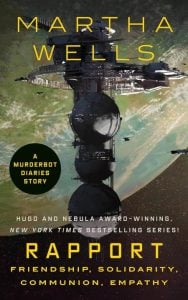 Rapport: Friendship, Solidarity, Communion, Empathy by Martha Wells
Rapport: Friendship, Solidarity, Communion, Empathy by Martha Wells
Returning to the world of The Murderbot Diaries, Martha Wells offers a novelette all about the complexities of an artificial intelligence embracing its emotions. Set sometime after Artificial Condition, the series’ second, Rapport finds the transport ship Perihelion (nicknamed ART by Murderbot) and its crew in the throes of a dangerous mission on a corporate-controlled station amid a hostile takeover. Like much of the rest of The Murderbot Diaries, Rapport is less about the sci-fi specifics of this crew trying to infiltrate a space station under siege and more about the messy human emotions of the crew as they embark on their mission. In the case of Rapport, Wells’ focus lies squarely on Peri as it reckons with its newfound emotions following its encounter with Murderbot in Artificial Condition.
For an artificial intelligence known for its emotional detachment, what does it mean for it to be forming an attachment to another quasi-artificial intelligence? And how can Peri express these shockingly human emotions to its very messy and nosy crewmates? Longtime fans of The Murderbot Diaries, especially Network Effect and System Collapse, will delight in the further exploration of Peri and its crew, deepening our understanding of their relationships and dynamics. And it’s always intriguing diving into a story set in the Murderbot universe, but from a point of view other than Murderbot’s. It’s a short, sweet read; one that perfectly satiates fans eager for more Murderbot after the conclusions of the show’s first season while also whetting the appetite for Wells’ upcoming eighth entry in the series. A must-read for all Murderbot fans and a sweet exploration of the complexities of human emotion. (4.5/5)
Available July 11th from Tor Books in eBook format and for free from ReactorMag.com.
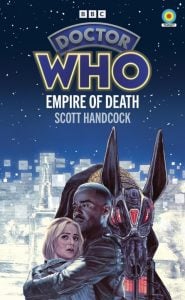 Doctor Who: Empire of Death by Scott Handcock
Doctor Who: Empire of Death by Scott Handcock
Adapting 2024’s “The Legend of Ruby Sunday” and “Empire of Death”, Scott Handcock’s Doctor Who: Empire of Death offers a very standard, though nevertheless enjoyable, novelization of the final story of the Fifteenth Doctor’s first season. If you’ve seen the episode, you’ll know exactly what to expect. Handcock’s novelization isn’t one of those that strays far from its source material, or even adds much to it. Instead, things play out pretty much as they did on screen—save for an extended prologue and a few little tidbits of deleted scenes here and there. That being said, Handcock’s novelization still breathes a lot of fresh life into a story that proved quite controversial when it originally aired.
In truth, Empire of Death may actually work better as a novel. Its strange pacing proves a strength in novel form, as does its exposition dumps and budget-straining ideas. On the flip side, however, some of the story’s more nonsensical parts come across even more nonsensically on the written page. But overall, Handcock’s novelization remains wholly enjoyable. He captures the Fifteenth Doctor and Ruby Sunday’s voices perfectly and delivers quite an enjoyable—if standard—reimagining of a very divisive episode. It won’t change anyone’s mind about Empire of Death, but it may prove to be the most enjoyable way to experience the story. (3.5/5)
Available July 10th from BBC Books in paperback, eBook, and audiobook formats.
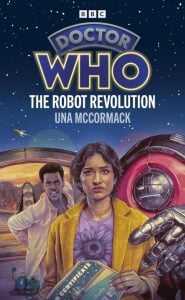 Doctor Who: The Robot Revolution by Una McCormack
Doctor Who: The Robot Revolution by Una McCormack
Adapting the season premiere of the Fifteenth Doctor’s second season, Una McCormack’s Doctor Who: The Robot Revolution takes what was a fairly standard episode of Doctor Who and elevates it into pulpy sci-fi fun. Like most Doctor Who novelizations, The Robot Revolution plays out fairly similarly to the televised episode—except here, McCormack adds quite a bit of depth to some of the story’s tertiary characters. The first couple of chapters are entirely devoted to furthering Belinda’s backstory, deepening her childhood and her relationship with Alan in the months and years before the televised story begins. But even better, McCormack breathes life into the history of Missbelindachandra One and those who live on it—namely, Sasha 55, a character implied to have a lengthy history with the Doctor during his time on the planet but wholly unexplored on TV.
Aside from those additions, The Robot Revolution reads much the same as the televised story played out. That being said, McCormack’s take on the story turns it into something akin to the kind of pulpy sci-fi novels of yesteryear—a tone the televised episode aimed for but never quite hit. It’s a rip-roaringly fun adventure through space, filled with robots and sci-fi cheese and plenty of twists and turns. It’s by far the most enjoyable way to experience The Robot Revolution—especially if you listen to the audiobook read by Varada Sethu, herself. Put simply, McCormack takes what was a fairly standard episode of Doctor Who and elevates it into something far more memorable and enjoyable. (4/5)
Available July 10th from BBC Books in paperback, eBook, and audiobook formats.
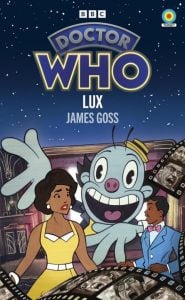 Doctor Who: Lux by James Goss
Doctor Who: Lux by James Goss
James Goss adapts the second episode of the Fifteenth Doctor’s second season, Lux, with all of the joyous fun he brought to his novelization of 2023’s The Giggle. And Goss proves to be a perfect choice for a story with as chaotic a villain as Lux is. Unfortunately, Lux proves to be one of those stories that works significantly better on screen than on the page, despite Goss’ attempts at fleshing out the story—especially when it comes to the Doctor Who fans and their backgrounds. Goss breathes a lot of life into the story, throwing every trick in the book to try and make it come alive on the page, but Lux nevertheless proves elusive.
It’s just one of those stories that really only works on television, what with its beautifully animated sequences and very visual gags. Even with the unlimited budget afforded by the page, reading about the Doctor and Belinda being animated in various classic animation styles pales in comparison to actually seeing them animated. And regardless of how well written Goss’ novelization is (and it is exceedingly well written), it just doesn’t quite have the same impact as the episode does. (3.5/5)
Available July 10th from BBC Books in paperback, eBook, and audiobook formats.
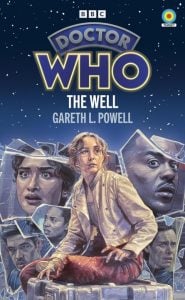 Doctor Who: The Well by Gareth L. Powell
Doctor Who: The Well by Gareth L. Powell
Adapting the third episode of the Fifteenth Doctor’s second season, Gareth L. Powell’s Doctor Who: The Well takes one of Doctor Who‘s most tense and suspenseful episodes and crafts it into a taut psychological thriller that stands strong against the competition. Like the rest of the most recent wave of Doctor Who novelizations, The Well plays out nearly identically to its televised counterpart. But what makes The Well stand out from the other recent Fifteenth Doctor novelizations is that its story is the rare one that works exceedingly well as both a novel and an episode of a TV series. Here, Powell expands the world of the story by offering brief glimpses at the histories behind the various members of the rescue crew, giving some of the tertiary characters some much-needed depth.
But mostly, The Well is just a darn effective bit of psychological tension. Powell’s novelization is every bit as good as the original episode was, making excellent use of the story’s inherent tension. And since the story’s villain is inherently unknowable, Powell’s given free rein to really lean into the inherent horror in the unknown. It’s a quick shot of terror wrapped in a very Doctor Who package that stands as a lovely complement to the original episode. It doesn’t necessarily offer anything strikingly new to the story, but it’s an immensely enjoyable way to experience the story nonetheless. (4/5)
Available July 10th from BBC Books in paperback, eBook, and audiobook formats.






